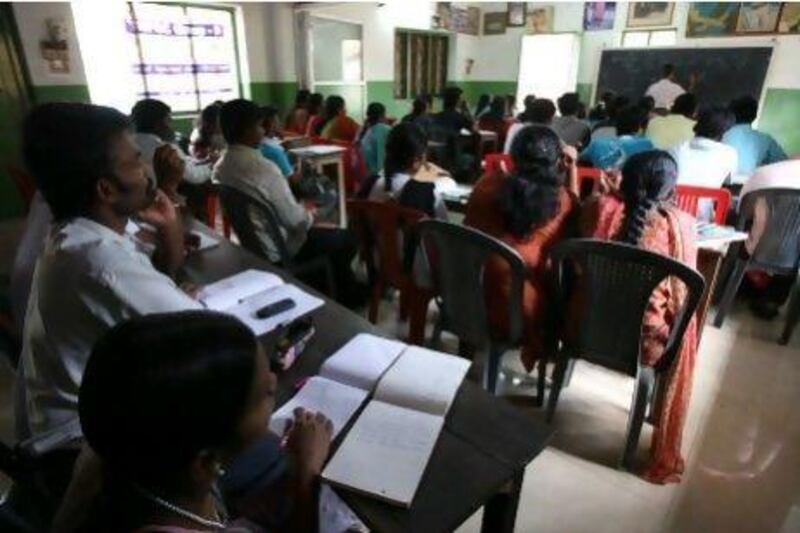NEW DELHI // India's parliament is a raucous place. MPs often shout down opponents. People rarely speak in turn and more than a dozen languages are used. A team of translators tries to bring order to the chaos but a shortage of skilled professionals is creating a problem in Parliament House.
India lifted a two-decade hiring freeze for translators this year, but the government is struggling to find new recruits who can keep up with the pace of debate in parliament.
India's 1.2 billion citizens speak more than 120 languages, 22 of which are recognised officially.
This diversity is reflected by MPs. The 50 men and women with parliament's Simultaneous Interpretation and Verbatim Reporting Service (SIVRS) are tasked with providing simultaneous translation of the parliamentary debate in 15 Indian languages, including English.
"You cannot compare reporting here within parliament with anywhere else in world," said an official with SIVRS, who asked not to be named as several members of the translation pool who have spoken to the press claim that is the reason they lost their jobs.
"Nowhere in the world are so many languages spoken on the floor of a parliament," said the official.
"Whatever transpires inside the parliament, we will be there to record everything."
The skill-set necessary to be a parliamentary translator extends beyond language.
"I tell the reporters, keep your eyes open, your ears open and your brains open so you can properly understand even the speakers gestures," said the official. Much of this is learnt through experience. "To understand dialects, lip movement, all of this comes only from someone who has been trained on-the-job, in a unique environment like this."
The official explained how one MP's speechmaking style included the use of many hand gestures.
"Once he imitated a gun going off. 'Dhishoom, dhishoom,' the politician said on the floor. Now how do you transcribe that action in words that makes sense?"
Members of SIVRS are tasked with transcribing and translating parliament's proceedings into both Hindi and English transcripts within an hour-and-a-half of the completion of a speech.
They need to have excellent shorthand skills - a method of rapid writing by means of abbreviations and symbols.
"Shorthand is the only solution to this unique parliamentary system," the official said.
The reporters are required to be able to write shorthand at 160 words per minute. However, in the two decades since the hiring freeze was put in place, the demand to learn shorthand has decreased dramatically with the rise of technology and recording devices.
Without the allure of a high-paying government job - the starting salary for a parliamentary stenographer is around 45,000 rupees (Dh2,969) a month - the skills of stenographers have fallen as well.
As a result, officials have lowered the speed required to 140 words per minute for the examinations this year.
Inderjeet Mittal, the deputy director of the Institute of Secretariat Training and Management in New Delhi, admits that technology is replacing stenography in most situations.
"Shorthand is time consuming," said Mr Mittal. Most stenographers train at 80 words per minutes, far below the required levels for work in parliament.
In addition to excellent stenographic skills, the translators/transcribers must also have an excellent grasp of language.
"Knowing the base of a language is very important, especially when you are working in the Parliament. It can get very tricky if you are trying to correct the mistakes of a politician," said Mr Mittal.
With there being a shortage of suitable candidates, the parliament service will have to train up stenographers from other government departments.
"This is a slow process," said Mr Mittal."You cannot start at 160 words a minute. You have to build up to that."
S Sekar, the principal of the Stenographers' Guild in Chennai in southern India, also trains students in shorthand. He said that the hiring freeze and the increase of the use of recording devices has reduced the number of students looking to study shorthand.
"Unfortunately, youngsters are not interested. Maybe some, but not like before when it was considered a necessary skill for a lot of jobs," Mr Sekar said.
There are about 10 students at the guild that could possibly join the ranks of India's stenography elite, he said.
V Sangeetha, 29, can write shorthand at about 120 words a minute, but she said she struggles to get any faster.
"This is already very tough for me," she said. "I am not sure I will be able to reach the next level."
Ms Sangeetha has been studying shorthand for the past year and a half. She estimated that it would take another six months before she will be able to reach the speed required to work in the Indian parliament. Even then, she was not confident she would be able to join their ranks.
"Politics is very challenging," she said. "There is no peace and quiet."
sbhattacharya@thenational.ae
Follow
The National
on
[ @TheNationalUAE ]
& Surya Bhattacharya on
[ @SuryatapaB ]





